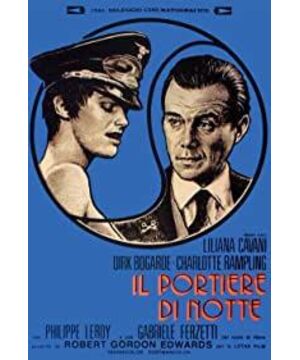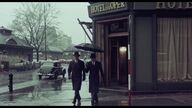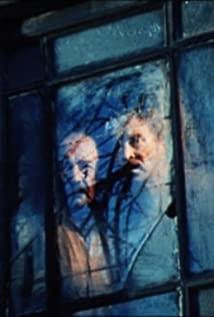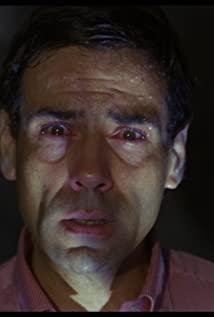"Midnight Gatekeeper" is a disgusting sadomasochistic film, but also contains a profound revelation of the world. The deformed love between Lucia and Max is not only the cruel appearance of the Nazis, but also the inner teeth of the two. Max found the best outlet in Lucia, and Lucia was willing to be abused. This kind of body-warming abuse is contrasted in the cold concentration camp, making them less like enemies and more like lovers in love, refining pure feelings from the entanglement of sin and sex. Therefore, when Lucia met Max, the Nazi officer who escaped punishment, in the hotel again, her terrified eyes flashed with unbearable memories of the past and mixed feelings of humiliation and pleasure. The sameness of pain and pleasure makes the world of humanity nuanced.
Pain and pleasure are always considered to be two completely different things, but in our lives, we often experience pain as pleasure. As the Roman poet Lucretius said: "It is sweet to see from the shore an unfortunate sailor wrestling with death in the waves, not that we gloat over the misfortunes of others, but that we are free from misfortunes. In addition, I can't help but feel fortunate." From painful pessimism to the ensuing pleasure, there is an accurate word to express it - "pleasure". People who deeply understand this way often use pain as a sign of love. For example, the Greek satirist Lu Xin taught a woman in "The Conversation of a Prostitute": "If a man has never fisted his lover; Broken hair, torn clothes. This person has not really experienced what love is." The
British Ellis used a vivid analogy for this in "Psychology of Sex": "We might as well assume that a musical instrument is Perception, and musicians can teach instruments to feel pain when they are playing and plucking... The pleasure of music is the pleasure of pain added to the instrument, and the effect of music on emotions is from whatever To add to the pain of the instrument; ... The musician did not want to teach the instrument to feel pain, but in order to obtain the pleasure of music, he had to play and play hard. The sadist's And so is the case."
Yet "sexual abuse" is only a lens through which we can see the complexity of human nature and the depth of history.
The classic scene in the film---Lucia sings in the club, the difficult and long violin sound gives the audience a sense of pain like a blunt knife cutting, surrounded by Nazi officers wearing uniform masks (one and the same" Person" instead of "Individual"), Lucia constantly makes provocative movements, and the person under the mask enjoys its "sadistic". Wilhelm Reich explained the "social function of sexual repression" in "Fascist Mass Psychology" as follows: "Sexual repression strengthens political reaction and makes individual masses passive and apolitical, Moreover, it also produces a second force in the deconstruction of human character - an artificial interest that actively supports the authoritarian order. If sex is not satisfied due to the process of sexual repression, then sex seeks various Various alternative gratifications.” And according to Ellis’s definition of sadomasochism in Sexual Psychology: “The act of sadism—whether given or received, or real imaginary, analogous, symbolic, or even merely imaginary—it can also become a method of satisfying sexual urges after it has matured, and at best, it can also be achieved without sexual intercourse The utility of it." At the end of the performance, they handed Lucia a box containing a freshly severed head. Lucia panicked, and the Nazis took off their masks and smiled contentedly. Killing replaced the body and became an extreme outlet for lust.
After the war, Lucia came to the United States, as the conductor's wife, living another life ordered by social ideology. "Sexual order is a class memory". The sadomasochistic experience in the concentration camp has long remained deep in Lucia's memory, like a dose of opium, which paralyzed her fear of the wartime Holocaust and comforted her lost desire in real life. When Lucia saw Max again, it was the time when her masochistic nature returned. The concentration camp experience of "interweaving pain and pleasure" is reproduced by the two people's trapped situation in the apartment----the food is less and less, the physical strength is also depleted day by day, and there is a ubiquitous society outside the door order and national ideology. At this time, only the body has all the possibilities of liberalism. As the only tool that can break through the historical memory and class politics of this world, the body is the only weapon against the social order. As Marguerite Duras said: "Let the world go to ruin, that is the only politics."
The film ends with the death of both Max and Lucia. The two completed their resistance to order and liberation of their own souls through their bodies.
View more about The Night Porter reviews











